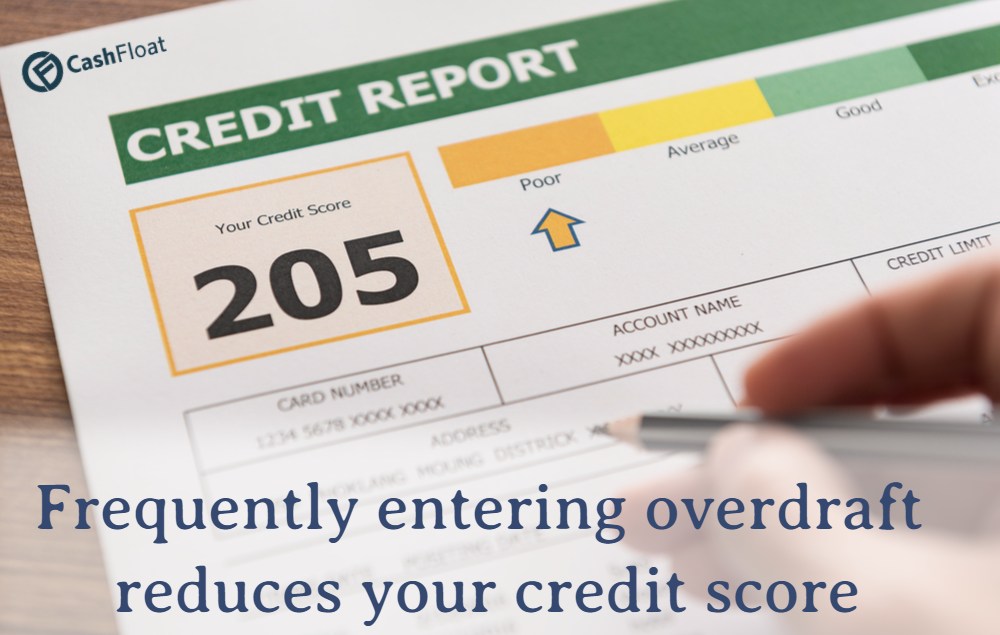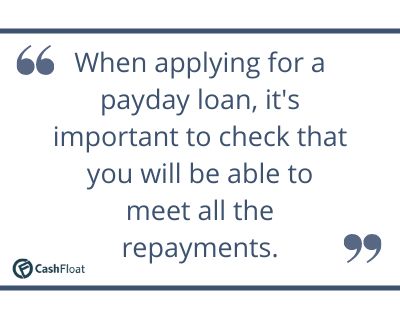Has this month brought with it higher expenses than usual? Do you want to prevent yourself from going into an unarranged overdraft? Cashfloat’s overdraft alternatives may be just the thing you need.
Overdraft facilities aren’t a form of free money. Entering an overdraft can result in fees and penalties. Unfortunately, if you don’t act quickly, it can rapidly turn into a nightmare. UK customers pay very high rates too, which is even more reason to pay attention. In this article we’ll cover the difference between payday loans and overdrafts, different bank overdraft fees and when to choose each.


More and more people every day are using Cashfloat’s payday loans as a cheaper overdraft alternative. Our payday loans can also help you avoid heft fees when you go into an unarranged overdraft.
Overdraft Charges Explained
When opening a bank account, you may be offered the option of an overdraft. This is essentially a window to enter a negative balance. It’s a solution that can be extremely helpful when you don’t have quite enough money to the pay the bills. Aside from making timely payments, it can prevent you from encountering various others fees.
However, entering the negative balance can see you incur charges too. Some banks will offer a small overdraft that can be used without facing those fees. Exceeding this level, or entering an overdraft that isn’t free, will lead to daily charges. In most cases, the amount will start at pence, but it can increase if the overall debt grows. And the bigger the fees, the harder it is to escape. You should consider if you will be better off with a unsecured short term loans to cover your expenses.
Should I Use My Overdraft
The overdraft facility is designed to make life easier for customers. When used appropriately, it can. But the only time it should really be used is to escape a spot of bother. Perhaps your employer has delayed payment. Or maybe unavoidable issues have made things tighter this month. Either way, this temporary solution can remove the stress until things correct themselves in the coming days. Quite frankly, nobody is going to begrudge paying a couple of pounds for that security.
However, the overdraft should be viewed as a last resort. Using it to buy clothes or other luxury items is never a suitable solution. Once you start treating it as part of your capital, you’re opening yourself up to a world of trouble.
If you can arrange a small overdraft, it can be a great way to avoid emergencies. Emergencies is the key word. Never use it unless you truly have to.
Bad Situations
Entering your overdraft for a day or two isn’t going to make a much of difference to your life, especially if it’s arranged. Many people find their fee-free arranged overdrafts are a necessity to cover their monthly spending. But if you’re not careful, overdraft fees can cause a lot of damage.
Once you enter an overdraft that incurs fees, it’s imperative that you find a quick escape. The longer you stay in the red, the more money you’ll end up losing. Sadly, once you fall into the vicious cycle, it’s possible to find that income is simply paying off the overdraft fees. If this happens, clawing your way back to black will feel almost impossible. That’s the type of debt that nobody wants.
Owing money is never nice. Owing money in a situation that shows no sign of easing up is nothing short of a nightmare.
Other Problems with Overdraft
Entering overdraft on a regular basis is clearly an unwanted situation. After all, entering it suggests that you’re already in a situation where you can’t afford to pay those fees. Even if you can’t, needlessly losing money is never a viable solution. However, it’s not only those direct issues that need to be considered.

Overdrafts, arranged or not, can show up on credit checks. And as everyone knows, damaging your credit history can have a negative impact on future financial commitments. It could limit your options or potentially sever them altogether. That’s just another reason that knowing the situation is crucial.
Why Does It Happen?
People can enter their overdraft for a variety of reasons. Unexpected bills, unforeseen circumstances or late payment from work can all play a role. However, this is an explanation for singular occurrences. The primary source of long-term problems is a lack of knowledge.
Of course, individuals should take responsibility for their finances. However, the environment of overdrafts and subsequent charges can be very confusing. Sadly, many banks are purposely very vague on details. Legally, they simply need to make you aware of potential charges. Details on exact rates can be omitted or left in pamphlets. And that can cause major problem for unsuspecting victims.
Surveys have shown that many people aren’t even aware of these charges. Naturally, this can create very dangerous territory indeed.
How Much Do Overdraft Fees Cost The Public?
UK citizens are amongst the biggest sufferers of overdraft fees. It can be attributed to poor financial management, high living costs and unfair banks. Regardless of the reasons, it costs people serious amounts of money. Research has shown that the average person can expect to incur in excess of £13,000 in overdraft fees during their lifetime. Whatever way you look at it, that’s an astonishingly high figure.
Banks are ultimately looking to make money, and many will take advantage of the situation. Worse still, once those problems start, it’s hard to do much about it. Once again, that lifetime average of £13,000 is far too large to ignore.
Who Can It Affect?
Many people will wrongly assume that they’re exempt from the potential damage. But the fact banks often have those overdraft features in place without customers knowing means that everyone is at risk. Of course, there’s more danger of being sucked into the abyss if you’re not earning much money. Nevertheless, even those with steady incomes shouldn’t ignore the danger.
It only takes one mishap to encounter those daily fees, which can sometimes be in excess of £5. As the aforementioned average lifetime costs shows, those small charges can soon add up too.
Cashfloat dynamic payday loans as an overdraft alternative
We’ve all been there. A month with higher expenses than usual, a couple of big purchases that couldn’t be put off, that bonus that didn’t come… and suddenly, you’re in the red. Help. You just need a quick cash injection to stop your bank from piling on those hefty charges for unauthorised overdraft. Wages come in a week… but what should you do until then? You need a solution, and quickly.
Have you ever been in this boat?
Ah, there’s nothing like the beach. Stretched out on the sand under the warm glow of the Sun, with the gentle lapping of the waves in the background… yes, this is paradise. A well-deserved break from hard work.
Your phone beeps. Come on, you’re on holiday! You take a quick glance at the message and… oh. Oh no. Not good. Your bank account has gone into overdraft. Your bills were a bit higher this month – but whatever the reason, if you don’t get more money into your account very soon, you’ll be hit with all sorts of fees and charges, probably about £20-50.
You slowly lick your ice cream as you ponder your options. You really don’t want to spend your last few days on the beach thinking about those charges piling up, but what choice do you have? Should you take out a payday loan online to cover the debt? Will you save money in the long run?
Let’s find out.
The big question:
Is a payday loan cheaper than an unarranged overdraft?
You could always borrow money for a week. That way you’ll have something in your account, so it’s not overdrawn. After some research, you discover that borrowing £300 for a week with Cashfloat will cost you a total of £16.75.
Is it worth paying £16.75 to avoid those charges, and to ensure that you can relax and enjoy your holiday?
There are lots of people in the red that think that an overdraft is the best solution out there. However, some new research by Which? has proved otherwise. During their research which compared an unplanned overdraft vs payday loans, Which? found that it was sometimes cheaper to take out a payday loan rather than an unplanned overdraft. This news came as a surprise to many people all of the UK. For years, payday loans have been scrutinised and given a bad name. Everyone has been warned off them and told to go to their bank for help instead. But, this new research has shown that unplanned overdraft fees can be four times more expensive than payday loans!
This news was shocking because it’s known that payday lenders can charge very high-interest rates. Some charge as much as 1,509% APR, and yet, they’re now cheaper than overdrafts. How is this possible? How can an instant loan be cheaper than getting an overdraft? All it takes is a quick look at some of the fees banks are charging their customers.
Overdraft Vs Payday Loans Fees
If you bank with NatWest and RBS, then you’re charged a fee of £6 per day, for going into overdraft. It’s important to note that this is for unplanned overdrafts, not ones that are already agreed upon beforehand. This fee is for people that go into an unplanned overdraft by more than £10. At TSB, HSBC and Lloyds, they can charge you up to £80 a month for being in your overdraft. Over at Halifax, there’s a £5 per day fee, with a max charge of £100.
All of these figures can seem a bit confusing, and it looks like a lot of money is being charged to customers. And, things are made even worse when you compare how much it costs to borrow £100. There are new FCA rules in place that put a cap on how much a payday lender can charge per day. The most they can now charge is 0.8% each day. This equates to £122.40 for borrowing £100 over 28 days.
|
|
|||
|---|---|---|---|

|
Natwest overdraft | £6 per day | |

|
Barclays overdraft | £8 per day | |

|
Halifax overdraft | £5 per day | |

|
HSBC overdraft | £5 per day | |

|
Lloyds overdraft | £5 per day | |

|
TSB overdraft | £5 per day | |
The Facts about Overdrafts
The following charges are for borrowing £100 for 28 days when you borrow from a bank via an overdraft. These figures are straight from the Which? research. Barclays are the cheapest out there, with £100 costing you £30 – which is still more expensive. Then, the rest of the banks are way out in front. Borrowing from Santander can cost you a touch under £70. TSB, HSBC and Lloyds will all charge you £80 for borrowing £100. Moving further up the scale, RBS charge a maximum of £90. Finally, you have Halifax, who charge £100 for unplanned overdraft fees.
How to avoid bank fees
Overdrafts aren’t the enemy. There’s nothing wrong with using them, but it’s crucial that you learn to use them responsibly. Your finances need to be handled with care at all times. Thinking about those overdraft charges is a key factor in achieving that overall feeling. Do not underestimate its importance.
The first thing you should do is take the time to understand any agreements. Different banks have unique rules and situations. Make sure that you know the regulations surrounding your specific account. This should ideally be done when opening it. But if you’ve already opened it, then it’s not too late to learn these details.
Apart from that, the key is to manage your finances. Again, facing a single charge of 75p isn’t going to cause major problems. However, you need to be sure that you’re avoiding any long-term stints in the red. That’s when problems really start to arise.
Overdraft or Payday Loans – Which One?
So, you can see that overdrafts can be far more costly than payday loans. If you bank with Halifax, then it can cost you nearly £80 more! It may seem like an easy and convenient way of getting money, but unplanned overdrafts are very expensive. What’s more, it’s very rare that you’re told of these charges when you open a bank account. If you agree to have an overdraft, then you will know all the fees. And, yes, a planned overdraft is far cheaper than both methods. But, a lot of regular current accounts don’t come with them. So, you only find out about these fees when you need an unplanned overdraft. People that need one are often in a financial emergency where they’re desperate for money. In such a situation, it may be cheaper for them to borrow the entire amount they need (£500, £1000, or more, depending on the circumstance) rather than getting charged ridiculous bank fees. It’s not fair, and something needs to be done about it.
Payday loans have become more affordable thanks to the FCA ruling. It’s been in place since January 2015, and you can see that it works. By capping interest rates, payday loans and short term loans online are now a much more viable option for people in need of emergency cash. These loans can also get repaid in manageable monthly instalments.

What other alternatives are there to an overdraft?
There may be various less costly options available for you. With each option, research whether your bank offers these services, and be sure you want to choose this option.
Link your regular account to your savings account – By doing this, your bank will automatically transfer money from your savings account to your current account, once it is overdrawn. There is usually a transfer fee.
Switch banks – Many mistakenly think that banks won’t let them join if they have a bad credit history. Many banks will, in fact and it may be worth considering. Some banks offer an interest free overdrafts limit, while others charge enormously high interest rates. Do your research and find the best bank for you.
Take out a payday loan with Cashfloat – Some banks will be unwilling to give leeway even to a day or two of being overdrawn. If this is the case, a short term loan from Cashfloat may save you paying a higher interest rate from the bank.
Payday loans Vs Unarranged overdraft in the UK – An ongoing debate
Many people debate over this, and it seems that they are both useful financial tools on both sides. A payday loan, if used responsibly, is designed to help with a temporary cash shortage. As you can see from the above scenario, other options may work out to be far more expensive. However, many argue that the interest rates are ridiculously high, and that the borrowers cannot afford the loans. Additionally, they are considered to be the ‘easy way out’. Instead of organising your finances and budgeting carefully, you can just take out a loan online to cover a big purchase that you can’t really afford.
Is a Payday Loan the Best Way to Avoid Expensive Overdraft Charges?
If you are about to go into overdraft, is a payday loan the correct choice? This depends on a number of factors:
- Has this happened before? Is it likely to happen again? If you are habitually running short of money at the end of the month, then you need a long term solution, not a payday loan. It’s time to sit down and work on getting your finances in order. Make a comprehensive list of all your income and expenditures. If you are spending more than you earn, you might want to seek some budgeting advice.
- Have you got any other options? Can you borrow from a friend or relative? Could you call up your bank and arrange an overdraft? An expensive overdraft is only if it’s unarranged. Learn more about arranged and unarranged overdraft in order to make an informed decision.
- Have you read the terms and conditions carefully? In the above example, a Cashfloat payday loan of £300 that is repaid in full after one week will cost a total of £16.75 in interest. Other payday lenders might offer different rates, and remember that the more you borrow, and the longer you borrow the money for, the more interest you will be paying. Check that you will be able to meet all the repayments, and make sure you know what will happen if you don’t manage to meet the repayments.


When is a payday loan a good idea?
A payday loan is a good idea when it is cheaper than the other options (such as expensive overdraft charges), when you know that you will be able to pay it back, and – most importantly – when it is purely a one-time solution. If you find yourself in need of a payday loan too often, you need to get your finances back in order.
Conclusion
We all have our months where unusual expenses crop up and many times we end up going into unarranged overdraft with very high interest rates. Cashfloat, one of the leading payday and short term loan lenders in the UK, provide instant decision payday loans as an overdraft alternative. Applying for our instant decision loans will enable you to receive cash fast in time of need. Join our thousands of happy customers today!
If you are still not sure what to choose, an overdraft or a payday loan, click here to read an article which will help you decide.


